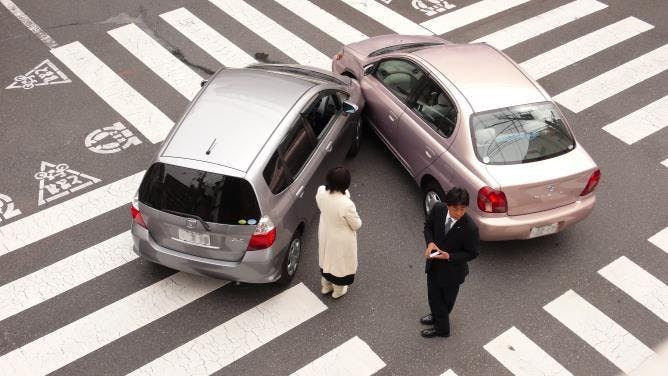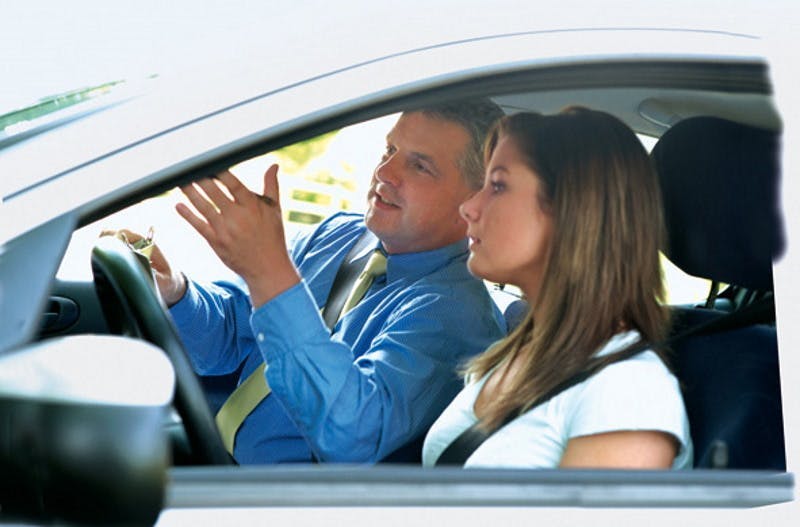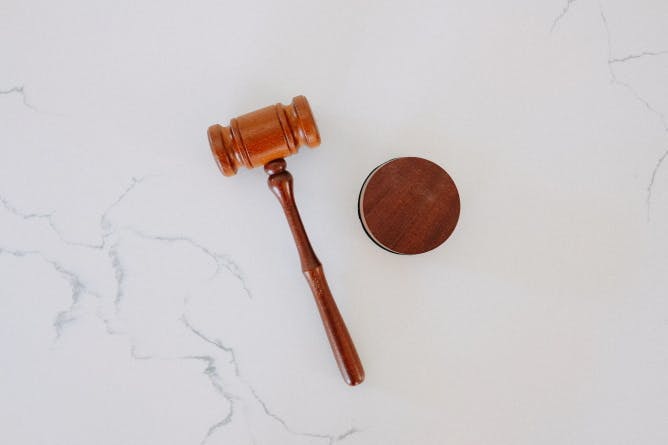Learning to drive can be a tricky process at the best of times. When things go awry, however, the situation can go from slightly stressful to a total meltdown. This is never more true than for those unfortunate enough to be involved in an accident while learning to drive. Making matters worse, the information surrounding accidents involving learners is often unclear. That's why we've set about to dispel the myths and uncover the truth. In this guide, we'll cover what to do if you're in an accident while learning to drive, and discuss the legal ramifications you need to consider.
What should I do if I'm involved in an accident while learning to drive?

Photo © Shuets Udono (cc-by-sa/2.0)
A collision on the roads can shake up even the steeliest of drivers. Going through such a stressful experience as a learner, though, can seem downright terrifying. The key here, however, is to remain as calm as possible. Failure to take proper action now could result in a minor incident turning into something much more serious. Fortunately, your instructor or supervising driver should be able to help you through the aftermath of any accident. However, it's always useful to know what steps to take when the worst happens.
When an accident happens…
- The first step to take is to bring the car to a complete stop. In fact, failing to do so is illegal.
- Shut off the engine and turn on your hazard warning lights.
- Check whether you or any of your passengers are injured, andif there are no injuries, note it down—it will be helpful if someone tries to make an injury claim against you.if anyone is hurt, call both the police and an ambulance as soon as possible.
- Stay calm. Getting angry or frustrated may aggravate things. Keep a clear head and assess the situation as best you can.
- Even if you think you may be to blame, don't admit responsibility or apologise at this stage. If the accident turns out not to be your fault, this will help support your claim and protect you from liability.
Be sure to…
- Exchange details with everyone involved if any damage or injuries occurred. This is a legal requirement.
- Swap insurance information with the other driver. If you're on a driving lesson with an instructor, they may be in a better position to provide these details.
- Record relevant information, including details of all vehicles involved, the time of the incident, driving conditions at the time and any injuries or damages caused. Be sure to take photos using your phone.
- Find out if the other driver involved is the registered owner of the vehicle, and get their details. If they are not, get the details of the vehicle's owner.
- As well as getting details of the driver of the other vehicle, note the details of any other passengers or witnesses.
- If you hit a parked car and the owner is not present, leave your details in a note on their windscreen.
Call the police if…
- Other drivers involved in the accident leave without giving you their details.
- The car accident blocks the road.
- You feel you may have been the victim of a crash for cash scam, or that the other driver deliberately caused the collision.
- The other driver has no insurance or is driving under the influence.
Note: Even if the accident does not warrant an emergency response, you must still report it to the police within 24 hours. You risk receiving a fine, points on your licence, or even a driving ban, should you fail to do so. In non-emergency situations, remember to call 101 rather than 999.
Driving lessons vs private practice: things to consider

The procedure to follow after a collision is the same regardless of whether you're driving your own car, that of a friend or family member, or your instructor's vehicle. However, there are a few things that will vary depending on the car you're driving in at the time.
If you're on a driving lesson with an instructor, their insurance policy should take into account the additional risks that come with teaching inexperienced drivers. They may ask you to contribute to the cost of repairs, however, if you cause serious damage. Private practice, meanwhile, may either take place in your own car or someone else's.
If you're driving someone else's car, and are a named driver on their policy, be aware that this will affect their no claims bonus. However, you have the alternative of opting for a short-term insurance policy. This is a second, separate insurance policy that allows you to drive another person's car, while preserving their no claims bonus if you have an accident.
If driving your own car, you'll have your own insurance policy—either annual or short-term. Here, any accident involving you will affect you as it would any other driver, with an impact on your own no claims bonus.
Planning on practising outside of your driving lessons? Make sure you're insured. For information on how to get the best deal, check out our article on learner driver insurance. We also have some great tips on how to get the most out of private driving practice!
Who is at fault if I have an accident while learning to drive?

An important aspect of any car accident is determining who is at fault. Of course, if another driver caused the collision, assigning blame is considerably easier. But what if you, as a learner driver, caused the accident? If you're a learner driver, it may be tempting to assume that your level of responsibility is lower than that of qualified drivers.
After all, there's a fully qualified, DVSA-approved instructor by your side—or, at the very least, a friend or family member with the experience necessary to sit with a learner driver. If any problems occur, that's on them, right? Wrong. According to legal precedent, learner drivers have the same duty of care as those who've passed their test. This means that if you, as a learner, are involved in an accident, the supervising driver won't be the one at fault—you will. This doesn't mean, though, that instructors and others accompanying a learner are off the hook.
Supervising drivers must still abide by certain conditions, including following any rules that also apply to the learner themselves. This means that they must, for example, meet the same eyesight requirements, not supervise a lesson under the influence, and avoid mobile phone use. Should they fail to abide by these regulations, they may find themselves penalised as well as the learner.
How common are accidents involving learner drivers?
The good news about all of this is that, while you can't completely discount the possibility of a collision on the roads, having a serious accident while learning to drive isn't as common as you may fear. While there are no official stats tabulating the number of accidents involving learners, law firm Slater + Gordon states that they “are among the safest drivers on our roads”. The only available relevant figures encompass collisions on driving tests; in 2015, there were 405, but the majority of these were caused not by learners themselves, but by other motorists.
This may come as a shock, given the limited experience of learner drivers. But it's not as counterintuitive as it may seem. While learners do have a more limited skill set than experienced drivers, they also, as a legal requirement, have someone accompanying them at all times, mitigating their lower ability levels. For newly qualified drivers, however, it's a totally different story. Without their instructor's watchful eye, nerves (or overconfidence!) can make their presence felt, and mistakes can creep in. With this in mind, brushing up on defensive driving techniques or even taking a Pass Plus course are solid ideas.
Being involved in an accident while learning to drive can be a real setback—but it isn't the end of the world. While you may be feeling discouraged, try not to let the incident play on your mind. Instead, get back behind the wheel as soon as you feel able and use it as a learning experience. You may find that it makes you more aware of the real risks of the road—and become a safer driver in the long run.
Subscribe for driving advice, offers & more
We'd love to let you know about our courses, news and offers via email. You may unsubscribe at any time.
Star Genie Limited trading as PassMeFast. Company number 10093359
Copyright © 2024 owned by Star Genie Limited
PassMeFast, Blue Tower, MediaCityUK, Salford, M50 2ST

